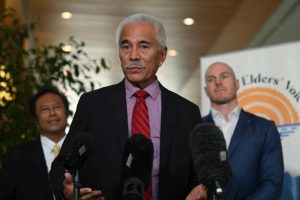
Australia is being urged to increase its investment in climate action, with a new report estimating the country is funding just one-tenth of its fair share globally.
The study being released by Oxfam and ActionAid Australia on Thursday calls on Australia to immediately increase its climate finance commitments to $3bn ahead of the UN climate meeting Cop27 to be held in Egypt in November.
The conference is also expected to see growing calls, including from Pacific nations, for wealthy high-polluting countries such as Australia to financially support a dedicated loss and damage facility.
At the Cop26 summit in Glasgow last year, a UN coalition of 134 developing countries plus China pushed for agreement on funding for a loss and damage facility, but faced resistance from developed nations.
The facility would cover the social and economic costs of damage arising from global warming including sea level rises and extreme weather events, much of which is being borne by poorer countries.
At the 2009 climate summit in Copenhagen, Australia was also a signatory to an agreement to establish a dedicated $100bn fund for climate change adaptation that was to be paid from wealthy countries to developing countries by 2020, however this has never met its original ambition.
Australia stepped back from its commitment to the fund in 2018, preferring to pursue bilateral climate commitments outside of the UN framework.
However, the Oxfam-ActionAid Falling Short report estimates that for Australia to meet its fair share of the original $100bn facility, funding would need to be $4bn annually from 2025 following an initial $3bn injection of funds.
Australia’s international climate funding is currently just a tenth of that amount, with average contributions at $400m a year between 2020 and 2025.
The Oxfam Australia chief executive, Lyn Morgain, said boosting the funding and ensuring more rigorous reporting rules in the lead up to Cop27 could help the Australian government reset its relationship with Pacific communities and show its commitment to climate action.
She said that each Australian produced eight times more carbon emissions a year than a Pacific islander, and “yet small Pacific island states such as the Solomon Islands and Fiji are suffering the full force of the climate emergency”.
“We know the new government wants to rebuild Australia’s reputation in our region. We can help achieve this and make a significant difference to the lives of people impacted by climate change by increasing climate finance,” Morgain said.
“Australians value fairness and being a good neighbour, but for years our leaders have been breaking funding promises and stalling on climate action. We need to start paying our fair share and holding ourselves accountable if our statements and arguments are to carry any weight with our regional neighbours.”
“Australia can and should do more. If we don’t pay up, it’s women and girls in the world’s poorest communities that will pay the price.”
The report calls on Australia to support the push from Pacific island nations and 124 other low-income countries for a standalone financing arm to address loss and damage at the forthcoming Cop27 conference.
Pacific island leaders met with MPs and senators in Canberra on Wednesday to call for the government to take more urgent climate action.
The former Kiribati president, Anote Tong, said Australian support for a loss and damage facility would encourage the rest of the global community to support the move.
“We are getting the message from the new Australian government that they do want to step up and act on climate change, that they want to re-engage with the Pacific and, of course, what that means is engaging with the climate issue,” Tong said.
“Australia can lead and needs to be a leader to step forward on this issue, because only then can we hope to get movement from the rest of the global community and the developed world.”
However, he cautioned against Australia “rebranding” government development assistance as climate finance assistance, saying it needed to be in addition to the existing aid program.

Leave A Comment